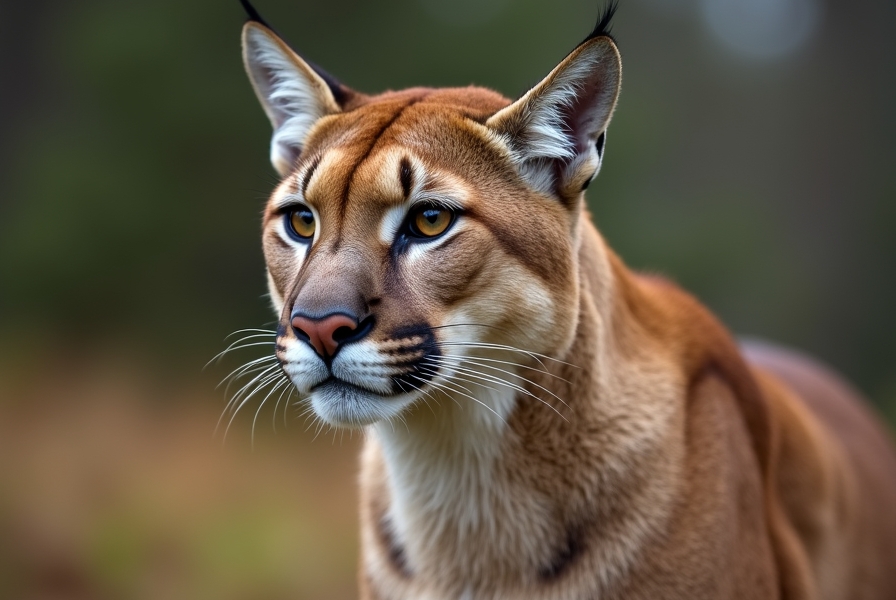Understanding the Presence of Mountain Lions in West Virginia
If you love wildlife or enjoy exploring the wild areas of West Virginia, you’ve probably wondered: Are there mountain lions in West Virginia? This is an exciting and sometimes debated topic. People report seeing large cats from time to time, but what do the facts and recent research say? Let’s explore the evidence, history, and what to do if you think you’ve spotted a cougar in the Mountain State.
Mountain Lion Background and Identification
Mountain lions are also known as cougars, pumas, or panthers. These powerful cats are native to North America and can be found from Canada to South America. Some important characteristics include:
- A long, slender body and tail (sometimes as long as 3 feet)
- Tawny or tan coloring, sometimes appearing grayish or reddish
- An adult size of about 6 to 8 feet from nose to tail tip
- No spots or stripes as adults (unlike bobcats or lynx)
Mountain lions are elusive, usually avoiding humans. They need large territories and hunt mostly at dawn or dusk.
Historical Range of Cougars in West Virginia
Centuries ago, the Eastern Cougar, a subspecies of mountain lion, roamed throughout Appalachia, including the forests of West Virginia. However, due to habitat loss, hunting, and a decline in prey, cougars disappeared from much of the eastern United States by the early 1900s.
The U.S. Fish and Wildlife Service officially declared the Eastern Cougar extinct in 2018, after decades of research and lack of verifiable evidence.
Do Mountain Lions Currently Live in West Virginia?
This is the question that fascinates so many visitors and residents. Here’s what recent reports and scientific studies reveal:
- Wildlife authorities and the West Virginia Division of Natural Resources (DNR) state there is no breeding population of mountain lions in the state.
- Verified evidence—such as photographs, DNA samples, or tracks—has not confirmed a wild, native cougar in West Virginia for over a century.
- Most sightings turn out to be mistaken identity, often involving bobcats, large domestic cats, or even dogs.
However, rare exceptions occur. Sometimes young male mountain lions travel hundreds of miles from established populations in the Midwest, and they have been documented in neighboring states like Tennessee, Kentucky, and even Pennsylvania. But these are isolated individuals, not breeding populations.
Why Do So Many People Report Cougar Sightings?
Every year, West Virginians and visitors report sightings of big cats. Experts say there are several possible reasons for this:
- Mistaken Identity: Bobcats, which are common in West Virginia, are much smaller than cougars but can be confused for them at a distance.
- Escaped or Released Pets: Occasionally exotic cats kept illegally as pets escape into the wild.
- Rare Visitors: On very rare occasions, wild cougars wander into the state from the west, but there is almost never physical evidence left behind.
What to Do If You Think You See a Mountain Lion
If you believe you’ve seen a mountain lion or you discover tracks or other signs while hiking or camping in West Virginia, take the following steps:
- Stay calm and keep your distance
- Try to safely photograph the animal or its tracks
- Note the location, time, weather conditions, and anything else important
- Report your sighting to the West Virginia Division of Natural Resources.
Authorities may follow up to investigate. Physical evidence such as DNA, scat, fur, or clear photographs is very helpful for wildlife researchers.
Why Confirming Mountain Lion Presence Matters
Why does it matter whether mountain lions live in West Virginia? There are several reasons:
- Wildlife Management: Confirmed presence could affect how habitats and game species are managed.
- Public Safety: Awareness can help people know how to safely enjoy the outdoors.
- Conservation: Accurate data help guide conservation strategies and maintain ecological balance.
So far, all available evidence shows that mountain lions do not have a breeding population in West Virginia. However, nature can surprise us. Reporting credible sightings and evidence is still important for the science community.
Frequently Asked Questions About Mountain Lions in West Virginia
Are there any cougars or mountain lions living in West Virginia today?
According to the West Virginia DNR and federal wildlife agencies, there is no evidence of a resident or breeding population of cougars or mountain lions in West Virginia today. Sightings sometimes occur, but most turn out to be misidentifications or rare wandering animals from other states.
When was the last confirmed mountain lion sighting in West Virginia?
No verified wild mountain lion has been documented in West Virginia for over 100 years. While possible sightings are reported every year, they lack physical proof like DNA, fur, or clear photographs.
Could mountain lions return to West Virginia in the future?
Yes, it is possible. Young male cougars have traveled east from growing populations in the Midwest and western states. Isolated individuals could wander through West Virginia, though establishing a new population would require suitable habitat, mates, and ongoing protection.
What large wild cats are found in West Virginia?
The only native wild cat in West Virginia today is the bobcat. Bobcats are much smaller than mountain lions and are commonly found throughout the state. They have a distinctive short tail, spotted fur, and are not a danger to most people.
What should I do if I believe I saw a cougar in West Virginia?
Stay calm and keep your distance. Try to take photos or videos and note details of your observation. Report the sighting to the West Virginia Division of Natural Resources so wildlife biologists can investigate.
Mountain Lion Safety and What You Need to Know
If cougar populations rebound and start to return to former territory like West Virginia, safety awareness will be important. Here are simple mountain lion safety tips you can follow if visiting areas where big cats might be present in North America:
- Do not approach or attract a mountain lion
- Keep children and pets close when hiking
- Make yourself look big if you encounter a large cat
- Back away slowly, do not run
- Report all sightings to local wildlife authorities
Sharing knowledge, learning to recognize wildlife, and respecting nature’s wonders make West Virginia’s wild lands a more inviting place for everyone. If mountain lions ever do return, you’ll know how to safely enjoy and report a rare encounter.










.svg)



